- Home
- Terri Blackstock
Ulterior Motives Page 10
Ulterior Motives Read online
Page 10
Ben looked at them with resignation as they came up the stairs.
“What’s going on now?” Tony asked wearily.
“Somebody broke in,” Ben said. “We were all gone, and this is what we came back to.”
“Anything missing?” Larry asked, looking into the rooms he passed.
“Nothing that I can see. Sharon would know better, though. She’s showing some houses this morning.”
“I saw her earlier,” Tony said. “She didn’t mention where she was heading.”
Ben raked a hand through his hair. “I think they may have been looking for something.”
“Looking for what?” Tony asked skeptically.
“I don’t know. Whatever I was supposed to have delivered last night, probably.”
“Oh. Right.” Tony blew out a heavy breath. “Ben, was there anyone with you when you discovered this?”
Ben looked insulted, but not surprised. “Yes. My kids.”
“Where are they? I want to talk to them.”
“They’re next door. I sent them over there as soon as we saw all this. I was afraid whoever it was was still in the house.”
“All right,” Tony said. “Larry, I’m going over there to talk to them. You can handle it from here.”
Larry nodded. “No sweat.”
Tony trotted back down the stairs. Just as he reached the kitchen door, it flew open, and Sharon burst in. “I saw the police cars!” she said in a panic. “What’s going on?”
“Everyone’s fine,” he said to calm her. “We got a burglary call. According to your ex-husband, someone broke into your house.”
She looked around at the contents of the pantry on the floor, the cabinet doors—through the arched doors, she saw the mess in the den. “I’d say he’s right. Is anything missing?”
“Televisions, computers, stereos are all still here. You might check your jewelry, and anything else you had that was valuable.”
“Where are the kids?” she asked quickly.
“Next door. Ben sent them over when they got home.”
“Good,” she said, turning and rushing back for the door. “I want to go make sure they’re all right.”
“I’ll come with you,” he said. “I need to ask them some questions.”
Christy watched out the window of her elderly neighbor’s living room, fascinated with the police cars in her driveway and in front of her house. She saw her mother’s car, which had not been there before, and she jumped up and down and yelled to her sisters. “Mommy’s home! Can I go tell her what happened?”
Jenny came into the room, accompanied by Mrs. Milton, the retired schoolteacher who had gotten the girls a plate of cookies to distract them. “No, Christy. You stay here until Mom or Dad tells us to come home.”
“But why? We’re missing all the excitement.”
Jenny pulled back the curtain and looked out the window. “I know, but—I can’t believe all this. Somebody’s really out to get Daddy.”
“Mommy’s coming!” Christy said as she saw her mother hurrying across the lawn with the cop who’d arrested her father trailing behind her. She jumped up and ran to the front door to fling it open. “Mommy, somebody robbed our house!”
Sharon bent down and hugged her younger child. “I know, honey. But it’s okay.” She looked up at Jenny, then at Emily hunkering in the corner, looking a little frightened. “Are you all okay?”
“Sure, Mom. We’re fine,” Jenny said. “Is he still in there? Did he take my computer or my stereo?”
“I don’t think so,” Sharon said. She looked at the widow still holding the plate of cookies. “Thanks for taking them in, Grace. I appreciate it.”
“No problem,” the older woman said. “Come in and relax for a minute. You look so tired.”
“It’s been a tough couple of days,” Sharon admitted. “Grace, girls, this is Detective Tony Danks from the St. Clair Police Department. He needs to ask you a few questions.”
“Me, too, Mommy?” Christy asked hopefully.
“You, too,” Tony said, sitting down so he’d be eye level with the child. “Tell me how you found out the house had been broken into.”
Christy’s eyebrows shot up with excitement. “We came back from the art store, and there was stuff all over the place. Mommy, it’s a mess!”
“I know, honey. I saw it.”
“How long were you gone?” Tony asked Jenny, and she sat down across from him, much more serious than Christy.
“About an hour, I guess,” she answered. “Daddy is going to help the girls paint a mural on Christy’s tree house, and we went to get some art supplies. Most of his paints are still at the studio.”
“All right,” Tony said, pulling out the pad he kept in his pocket and making a note. “Jenny, Christy, Emily, I want you guys to think real hard when I ask you this question. When you left, who was the first one in the car?”
“I was!” Christy shouted, shooting her hand in the air.
Emily raised her hand, too. “No, it was me. We tied!”
“If we tied, then how could you be there first?” Christy asked. “I was first.”
“No, I was.”
“Okay, so you both got out there first,” Tony said, chuckling. “Who was next?”
“I was,” Jenny said, frowning. “Why?”
“So your dad was the last one out of the house?”
“Yes,” Jenny said. “He locked up.”
“How long was he in there before he got to the car?”
She looked disturbed at the question, and looked questioningly up at her mother. Sharon shrugged and nodded for her to answer. “Well, I don’t know. A few minutes. He said he couldn’t find his wallet.”
“Did he find it?”
“Yes, and he came on out.”
“I see.” He made a note of that, then glanced up at Sharon. She was getting that look on her face that said he had a lot of nerve, but he pressed on. “Now, you went to the art store, and bought supplies, right? Did you stop anywhere else?”
“No,” Christy volunteered. “We went right there and right back.”
“All right. Who was the first one back in the house?”
“We all went at the same time,” Jenny said. “The girls went in first, then Dad and I were right behind them.”
“And which rooms did you see?”
Jenny looked confused. “Well, uh . . . I saw the kitchen, and the den, and then I went into the living room. That’s when Dad sent us over here.”
“So you didn’t see the rest of the house?”
“No.”
“Did any of you?”
“No,” Jenny said. “Dad wanted us out in case he was still there.”
Sharon was getting impatient. “What are you getting at, Detective?”
“I’m just asking questions,” he said. “Now, your dad’s wife. Emily’s mom. Where is she?”
“She took Bobby to the doctor,” Jenny said. “He’s sick.”
“And how long has she been gone?”
“Hours,” Jenny said. “They had to work her in, because she didn’t have an appointment.”
He made another note, then looked up at Mrs. Milton. “Grace, did you see any cars over there earlier? Anybody who didn’t belong there?”
“No, I’m afraid not,” the woman said. “I didn’t know anything was wrong until the girls came running over.”
“Okay. We’ll question some of the other neighbors to see if anyone saw anything.”
“Good,” Sharon said.
He got up and held out a hand for Christy, and she shook proudly. “Thanks for your help,” he said.
“Sure. Can we go home now?”
“Stay here until the police get finished. Sharon, can I speak to you outside?”
“All right.” She thanked Mrs. Milton again, then followed him out into the yard. “What is it?”
He saw Larry on his way across the yard to speak to him.
“Sharon, in light of our conversation this mornin
g, I know you’re not going to like what I have to say,” Tony said as Larry approached.
“Oh, no. You’re not going to blow this off like it didn’t happen, are you? You’re not going to ignore this! This is my house!”
“I’m not convinced anything happened,” he said. “Ben was the last one to leave the house. He hung around in there long enough to have pulled the cushions off, opened some doors, upset some shelves. Jenny only saw the front rooms when she came back. Between the time they got home and the time the police showed up, he had plenty of time to go through the rest of the house, making it look like someone had been there. There was no sign of forced entry, no one has seen anyone who didn’t belong here—”
“You haven’t questioned everyone yet! You don’t know!”
“And it doesn’t look like anything was taken,” Larry added. “It doesn’t look like a robbery.”
“You people are nuts. Why would Ben do this?”
“The same reason he staged that little drama last night. To throw us off. Make us think we’ve got the wrong guy. He’s desperate, Sharon, and frankly, I’m beginning to wonder if it isn’t dangerous having him in the house at all.”
“So what are you saying?” she asked, keeping her voice low so her neighbors and kids wouldn’t hear. “That I should send him back to jail? Just because you refuse to believe that someone actually could have broken into my house to look for whatever it is he thinks Ben has?”
“It just looks too suspicious, Sharon.”
“And it may not have been Ben who did it,” Larry conceded. “It could have been his wife, trying to help him out.”
“No way,” Sharon said. “There’s a killer out there, and he’s framed Ben, and he’s called and threatened him, and now he’s broken into my house, and you aren’t going to do one thing about catching him, are you?”
“Sharon . . .”
“I had more respect for you when I left the station this morning, Tony. I thought you might really have a conscience, that you’d do a good job no matter what it cost you. That you were a good cop. But I was wrong.”
He looked as if he’d been slapped across the face. “Sharon, I’m doing my job.”
“No, you’re not! You’re passing the buck because you’re too lazy to consider any other possibilities.”
“We are considering them, Sharon,” Larry said. “We just have to tell you what our gut instinct is. It’s not unusual for someone accused of a crime to try to throw us off the track. We have to tell you if we think the man living in your house is putting your family in danger.”
“We’re in danger, all right,” she bit out. “But I obviously can’t turn to St. Clair’s finest for help. The danger isn’t coming from my ex-husband, detectives. It’s coming from your apathy!”
She turned and fled into the house, leaving them both standing in the driveway. Tony stood there for a moment, watching her go. Finally, he turned and started walking away from the house.
“Where are you going?” Larry asked.
“To question the neighbors,” he said irritably. “Might as well get started. We have a lot of ground to cover.”
The police were finishing their report and clearing out as Sharon came back into the house. She found Ben sitting alone at the dining- room table, his hands covering his face.
“What was he looking for, Ben?” she asked, leaning in the doorway, suddenly feeling too weak to stand straight. “What does he want?”
“If I knew . . .” He rubbed his eyes and looked up at her. “Do you at least believe he was here? That I didn’t do this?”
“Of course I do. I wish it had been you. I wouldn’t be so scared.”
“I ought to just let them take me back to jail.”
“Right,” Sharon said. “That should solve everything.”
“Well, look at your house. He ransacked it.”
She shook her head. “Actually, it doesn’t look so bad. We can put it all back together. It just feels so creepy, knowing he was here.”
He rubbed his temples, trying to think. “I was just going back over everything with the cops. In the second phone call, he said it was too long to fold the garment bag. That’s how he knew it wasn’t what he wanted. It’s got to be a painting . . . something really valuable . . . maybe rolled up. I’ve been trying to think of all the things I was working on in the studio. There were a couple of things Dubose bought recently that I was restoring. They had some value, but not this much.”
“Maybe if you could get back into the gallery and look around, you could find it.”
“If that’s where it is, why didn’t he find it when he killed Dubose?” He looked up at her with helpless eyes. “Sharon, I know how this looks.”
She heard a car pulling into the garage, and glanced out the window. “Anne’s home.”
“I don’t know how much more she can take,” he said.
Sharon knew the feeling, but she didn’t voice it. “Guess I’ll get busy putting Humpty Dumpty back together again.”
He got up wearily. “I’ll help. We’ll all help.”
Sharon left the room before she had to confront Anne again.
CHAPTER NINETEEN
The telephone in Eric Boudreaux’s elegant hotel room rang, and he picked it up quickly.
“Yes?” he said in his French-accented voice.
“Mr. Boudreaux! How are you?”
Boudreaux was quiet for a long moment. “Impatient. As a matter of fact, I was just planning to ring the airport and book a flight back tomorrow. That is, unless you have something for me.”
“I, uh . . . I need another day or two. Please. I’m trying to be very careful so as not to call too much attention to us. One can’t be cavalier about an exchange of this sort.”
“You do not have it, do you, Monsieur Lieber?”
A pause. “Of course I have it. And you want it. Dubose showed you the snapshot of it, didn’t he?”
“He did. But I have yet to touch the picture.”
“You’ll touch it, my friend,” the voice said with a chuckle. “Very, very soon. Don’t return home just yet. I want you to have it, but if you return home, I’ll have to offer it to another buyer.”
“This was not in the agreement,” Boudreaux said. “I was to stay for two days, then return with the picture.”
“No one counted on Dubose’s untimely death.”
“No, you are right,” the Frenchman said. “And I must tell you that I am growing quite suspicious, myself. I don’t relish the idea of being a—how you say—accomplice to murder.”
“I had nothing to do with his death. Nothing at all. It was an unfortunate coincidence that it happened the very week you were to meet with him.”
“But if his death was motivated by greed because of this picture,” Boudreaux said, “I would hesitate to do business with anyone involved. My reputation is flawless, and I intend to keep it that way. My crimes have always been harmless.”
“And they will continue to be, sir. Trust me.”
“Then when will you deliver?” Boudreaux asked.
“Soon.”
“Tomorrow,” he insisted. “If I do not hear from you tomorrow, I will leave.”
There was a sigh. “You’ll hear from me. Please, wait until you do. I anticipate having the painting by tonight. You will have it immediately after that.”
“If I do not, you will have to bring it to me in LeMans,” Boudreaux said. “Smuggling it through customs will be your problem, not mine.”
“I’ll be in touch tomorrow, Mr. Boudreaux. You won’t be sorry you waited.”
“I sincerely hope not,” Boudreaux said, and hung up the phone.
CHAPTER TWENTY
Sharon took the easy way out and ordered pizzas that night, so that they wouldn’t have to subject themselves to a sit-down dinner all together. She worked into the night putting things back where they belonged. When they were finished, everyone went to their bedrooms early, and Sharon went up to tuck in Christy and Emily.
“I’m glad Bobby’s better,” Christy said as her mother covered her with the Laura Ashley comforter. “He had a bad ear infection.”
“And an earache, too,” Emily added.
Sharon smiled. “Well, he should sleep better tonight.”
“Mommy, are you scared?”
Sharon’s smile faltered. “Why do you ask that?”
“Because that man was in our house. What if he comes back?”
“He won’t,” Sharon said. “Everything’s locked up tight, and we’re all home now. He won’t come while we’re home.”
“Are you sure?”
“Positive,” she lied. “Emily, are you comfortable? I could get you a softer pillow if you need it.”
“I like this one,” Emily said, snuggling up next to Christy. “I wish I could live here all the time.”
Sharon smiled in spite of herself. She took a deep breath and asked, “How about if we say prayers together?”
“Okay,” Christy said, “but you lie down between us.”
Sharon crawled between them on the bed and got under the covers. She put her arm around Christy, and Emily snuggled up to her as well, expecting the same affection. Sharon grinned and slid her arm around her. The children didn’t understand the politics of their family, she thought. And that was good.
She prayed aloud for their father, and for the man who was out there causing so much trouble, and for Bobby’s ears and his cold, and for the safety of everyone in their home. When she finished, she lay there a moment, holding both girls.
“Tell us a story, Mommy,” Christy said. “Please.”
“I’ll tell you part of one,” Sharon said. “And then you tell me part.”
Christy giggled. “Okay. You start.”
Sharon sighed and thought for a moment. “Once upon a time, there was a little girl named . . .”
“Named Beth,” Christy said. “Can that be her name, Mommy?”
“Okay, Beth. And she lived in a beautiful little cottage with flowers all around.”
“And it had this cool climbing tree in the front yard, didn’t it, Mommy?”
“That’s right.”
“No, that’s wrong!” Christy changed her mind and sat up in bed. “The cottage was in the tree!”

 Aftermath
Aftermath Shadow of Doubt
Shadow of Doubt Second Chance - 05 - Never Again Good-Bye
Second Chance - 05 - Never Again Good-Bye Miracles
Miracles Broken Wings
Broken Wings the Cape Refuge (Cape Refuge Series Book 1)
the Cape Refuge (Cape Refuge Series Book 1) Shadow in Serenity
Shadow in Serenity Distortion (Moonlighters Series)
Distortion (Moonlighters Series) Second Chance - 02 - When Dreams Cross
Second Chance - 02 - When Dreams Cross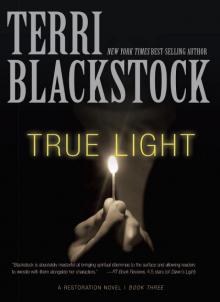 True Light
True Light Private Justice
Private Justice Last Light
Last Light Downfall (An Intervention Novel)
Downfall (An Intervention Novel) Distortion: Moonlighters Series: Book Two
Distortion: Moonlighters Series: Book Two Evidence of Mercy
Evidence of Mercy If I Run
If I Run Southern Storm
Southern Storm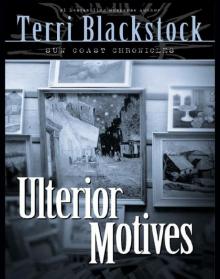 Ulterior Motives
Ulterior Motives Emerald Windows
Emerald Windows River's Edge
River's Edge Intervention
Intervention The Heart Reader
The Heart Reader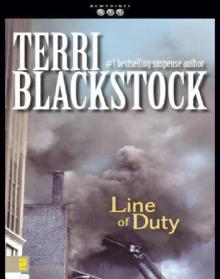 Line of Duty
Line of Duty Twisted Innocence
Twisted Innocence When Dreams Cross
When Dreams Cross Downfall
Downfall Cape Refuge
Cape Refuge Breaker's Reef
Breaker's Reef Night Light
Night Light Double Minds
Double Minds Justifiable Means
Justifiable Means Covenant Child
Covenant Child If I Live
If I Live If I'm Found
If I'm Found Vicious Cycle
Vicious Cycle Presumption of Guilt
Presumption of Guilt Trial by Fire
Trial by Fire Word of Honor
Word of Honor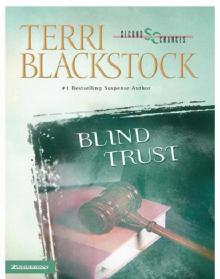 Second Chance - 03 - Blind Trust
Second Chance - 03 - Blind Trust Blind Trust
Blind Trust Twisted Innocence (Moonlighters Series Book 3)
Twisted Innocence (Moonlighters Series Book 3) Predator
Predator Dawn's Light
Dawn's Light Chance of Loving You
Chance of Loving You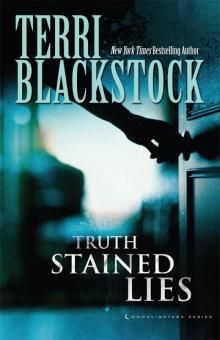 Truth-Stained Lies
Truth-Stained Lies Never Again Good-Bye
Never Again Good-Bye Catching Christmas
Catching Christmas